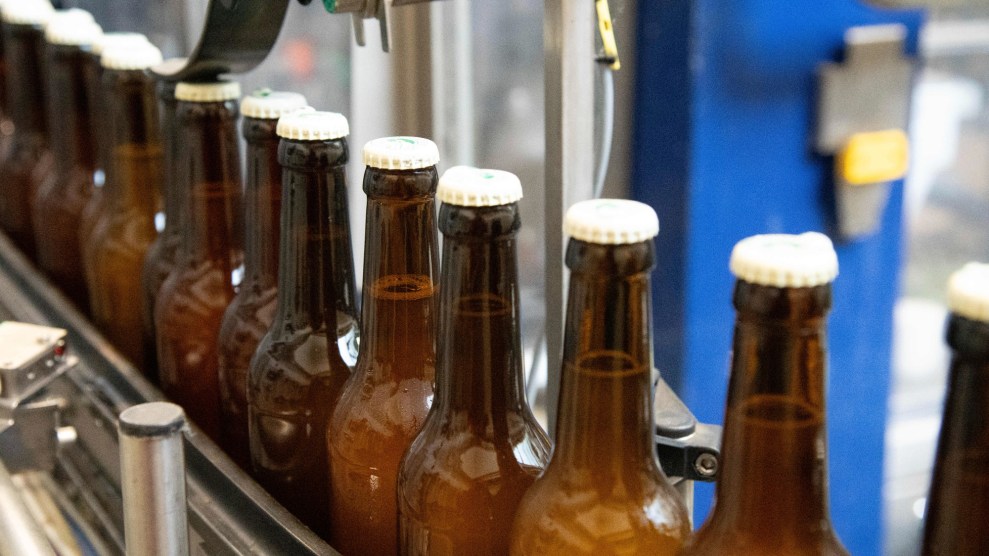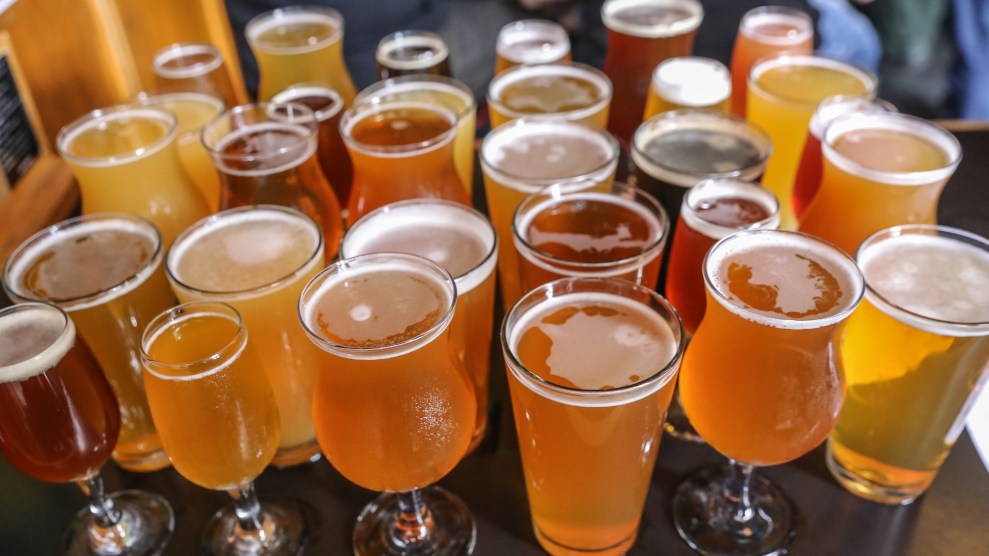
Malte Ossowski/Sven Simon/Zuma
This story was originally published by the Guardian and is reproduced here as part of the Climate Desk collaboration.
Climate breakdown is already changing the taste and quality of beer, scientists have warned.
The quantity and quality of hops, a key ingredient in most beers, is being affected by global heating, according to a study. As a result, beer may become more expensive and manufacturers will have to adapt their brewing methods.
Researchers forecast that hop yields in European growing regions will fall by 4-18 percent by 2050 if farmers do not adapt to hotter and drier weather, while the content of alpha acids in the hops, which gives beers their distinctive taste and smell, will fall by 20-31 percent.
“Beer drinkers will definitely see the climate change, either in the price tag or the quality,” said Miroslav Trnka, a scientist at the Global Change Research Institute of the Czech Academy of Sciences and co-author of the study, published in the journal Nature Communications. “That seems to be inevitable from our data.”
Beer, the third-most popular drink in the world after water and tea, is made by fermenting malted grains like barley with yeast. It is usually flavored with aromatic hops grown mostly in the middle latitudes that are sensitive to changes in light, heat and water.
In recent years, demand for high-quality hops has been pushed up by a boom in craft beers with stronger flavors. But emissions of planet-heating gases are putting the plant at risk, the study found.
The researchers compared the average annual yield of aroma hops during the periods 1971-1994 and 1995-2018 and found “a significant production decrease” of 0.13-0.27 tons per hectare. Celje, in Slovenia, had the greatest fall in average annual hop yield, at 19.4 percent.
In Germany, the second-biggest hop producer in the world, average hop yields have fallen 19.1 percent in Spalt, 13.7 percent in Hallertau, and 9.5 percent in Tettnang, the study found.
Beer-brewing in central Europe dates back thousands of years and is a cornerstone of the culture. People in the Czech Republic drink more beer than anywhere else in the world, according to a report from the Japanese beermaker Kirin. In Germany, where beer-making has been regulated for 500 years by a “purity law,” the Oktoberfest welcomes 6 million beer-drinkers from across the world into its tents each year.
The taste of beer does not just depend on the hops, but it explains part of the drink’s popularity, said Trnka. “Across the pubs of Europe, the most frequent debate except weather and politics is about the…beer.”
But weather and politics are both changing the taste of beers. World leaders have promised to try to stop the planet heating by more than 1.5 degrees Celsius above preindustrial levels by the end of the century, but are pumping out too much greenhouse gas to meet that target.
The study found the alpha acid content of hops, which give beer its distinct aroma, had fallen in all regions. As temperatures rise and rainfall dwindles, some hop farmers have moved gardens higher, put them in valleys with more water and changed the spacing of crop rows.
Andreas Auernhammer, a hop farmer in Spalt in southern Germany, said the total rainfall in his fields had changed little but that now “the rain does not come at the right time.” He has built an irrigation system to feed the hops at critical periods. “We would have big problems if we couldn’t water them.”
The researchers modeled the effect of future warming on crops using an emissions scenario similar to current policies. By 2050, they found, hop yields will fall 4.1-18.4 percent compared with the average from 1989-2018 if no measures are taken to adapt. The projected decline will be driven mainly by hotter weather and more frequent and severe droughts.
Trnka said: “Growers of hops will have to go the extra mile to make sure they will get the same quality as today, which probably will mean a need for greater investment just to keep the current level of the product.”
Auernhammer said the climate threat to hops was important but added it was not the biggest factor in the price of a beer. High energy costs, driven by the soaring price of fossil gas since Russia’s invasion of Ukraine, have played a bigger role for brewers. “The hops inside a beer do not cost as much as the cap on top of the bottle,” he said.












